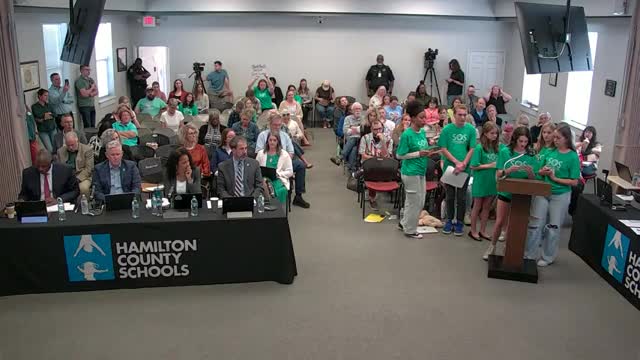Teachers and community speakers press board on testing, public-comment rules and PECCA appointments
October 10, 2025 | Hamilton County, School Districts, Tennessee
This article was created by AI summarizing key points discussed. AI makes mistakes, so for full details and context, please refer to the video of the full meeting. Please report any errors so we can fix them. Report an error »

Multiple speakers used the meeting's public-comment period to press the board on testing practices, public-comment access and the upcoming PECCA process.
Jeremy Barrett, a 25-year teacher at the Center for the Creative Arts, told the board that newly introduced “snapshots” amount to rebranded benchmarks that consume instructional time without adding useful information. “They don't cost much money, but they do cost something even more valuable and that's time,” Barrett said, adding that the snapshots required by central office are treated as mandatory in practice and do not yield useful classroom-aligned data.
Jeanette Omar Hill, president of the Hamilton County Education Association, spoke about PECCA — the Professional Educators Collaborative Conferencing Act — and the labor-representation process the district will follow this year. Hill said the statute requires a special-questions committee and that the board packet included an opportunity to appoint the district's team; she described the committee composition as four district appointees and four educators and thanked the board for a collaborative relationship as bargaining moves forward.
Community member Megan Gilbert raised concerns about meeting scheduling and public-comment procedures, supporting proposed shifts in meeting times to increase public access but warning against moving the public-comment period to the same day as votes. Gilbert urged the board to require a listening session when a topic draws a large number of speakers or significant written input, proposing a policy trigger (for example, a threshold number of sign-ups or emails) to mandate broader public engagement.
Why it matters: teachers and union leaders argued that testing practices and board processes affect instruction and public trust. Barrett asked the board to honor the prior effort to reduce unnecessary testing and to trust classroom teachers to assess student learning. Hill framed PECCA as a formal statutory process in which both district appointees and educators participate.
Ending: the meeting record shows these public comments were taken as part of the public-comment segment; the board did not take immediate action on testing policy, PECCA appointments or public-comment rule changes during this session.
Jeremy Barrett, a 25-year teacher at the Center for the Creative Arts, told the board that newly introduced “snapshots” amount to rebranded benchmarks that consume instructional time without adding useful information. “They don't cost much money, but they do cost something even more valuable and that's time,” Barrett said, adding that the snapshots required by central office are treated as mandatory in practice and do not yield useful classroom-aligned data.
Jeanette Omar Hill, president of the Hamilton County Education Association, spoke about PECCA — the Professional Educators Collaborative Conferencing Act — and the labor-representation process the district will follow this year. Hill said the statute requires a special-questions committee and that the board packet included an opportunity to appoint the district's team; she described the committee composition as four district appointees and four educators and thanked the board for a collaborative relationship as bargaining moves forward.
Community member Megan Gilbert raised concerns about meeting scheduling and public-comment procedures, supporting proposed shifts in meeting times to increase public access but warning against moving the public-comment period to the same day as votes. Gilbert urged the board to require a listening session when a topic draws a large number of speakers or significant written input, proposing a policy trigger (for example, a threshold number of sign-ups or emails) to mandate broader public engagement.
Why it matters: teachers and union leaders argued that testing practices and board processes affect instruction and public trust. Barrett asked the board to honor the prior effort to reduce unnecessary testing and to trust classroom teachers to assess student learning. Hill framed PECCA as a formal statutory process in which both district appointees and educators participate.
Ending: the meeting record shows these public comments were taken as part of the public-comment segment; the board did not take immediate action on testing policy, PECCA appointments or public-comment rule changes during this session.
View full meeting
This article is based on a recent meeting—watch the full video and explore the complete transcript for deeper insights into the discussion.
View full meeting
